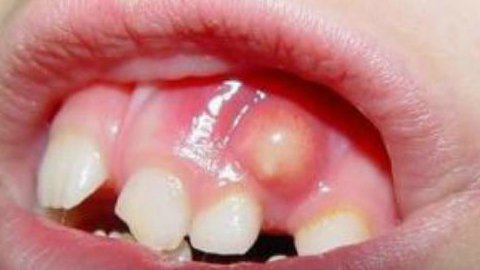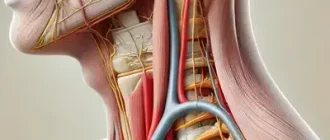Bacterial infection in the core of a tooth triggers a severe and distressing toothache with the development of a pus-filled lump. This can lead to an enduring and severe pain that may extend to areas such as the jawbone, neck, or ear.
Potential complications and dangers
If left untreated, a toothache caused by an abscess can lead to serious problems that require immediate attention as a dental emergency. The bacteria causing the abscess can move to other parts of the body, like the jawbone, causing a bacterial infection called osteomyelitis.
It can also enter the bloodstream, causing a potentially fatal systemic infection known as sepsis.
Furthermore, the pressure from the infection can cause the abscess to burst, spreading the infection to nearby tissues and causing facial cellulitis.
If you are currently experiencing a toothache from an abscess, it is important to seek advice from a dentist or endodontist promptly to reduce the risk of complications.
Causes of Abscess Toothache
A painful toothache often arises from an abscess, often triggered by a bacterial infection. Typically, the problem begins when bacteria infiltrate the innermost portion of the tooth called dental pulp, which consists of blood vessels, nerves, and tissues. This intrusion commonly happens as a result of tooth decay, gum disease, or a cracked tooth.
Bacterial multiplication and spreading occurs when the pulp is harmed, leading to an infection. This can lead to the accumulation of pus and the formation of a dental abscess. Dental abscesses can arise in different areas of the tooth and are often linked to severe and persistent toothache, sensitivity, and swelling in the mouth or face.
Hence, it is crucial to take care of one’s oral hygiene. Getting regular check-ups at the dentist can aid in identifying and treating problems early. Additionally, having a balanced diet and avoiding consuming excessive sugary beverages or snacks can help maintain oral health and prevent such issues. It is important to remember that if an abscess is not treated, it can lead to severe and potentially life-threatening complications. Therefore, it is recommended to seek immediate dental attention if an abscess is suspected.
Symptoms of Abscess Toothache
Severe and persistent toothache accompanied by throbbing pain, sharp or shooting pain, is a typical symptom of a tooth abscess.
When a tooth is infected or decaying, it can cause an abscess. This leads to severe pain that usually starts at the root of the tooth. This condition often causes symptoms such as a sharp, gnawing, or throbbing toothache. Additionally, there may also be a fever, tender lymph nodes in the neck, and inflammation or redness around the affected area.
Some additional symptoms to note include continuously having unpleasant breath or a sour flavor in the mouth, frequently accompanied by the discharge of pus into it. Additionally, there may be challenges when it comes to chewing or biting. Individuals may also feel discomfort when closing the mouth or merely touching the affected region.
When these symptoms arise, it is extremely important to seek advice from a dentist promptly. If a tooth abscess is not treated, it typically does not improve on its own and can potentially cause severe complications that could be life-threatening. If dental pain is accompanied by a fever and swelling, it is vital to immediately seek medical assistance.
How to Treat Abscess Toothache
Experiencing an abscessed toothache can be very painful, however, there are remedies available that can provide relief.
To start with, it is essential to obtain professional dental help for a tooth abscess as it cannot be cured without treatment and attempting to treat it at home is not effective. A specialist in root canals or a dentist will first relieve the pain and remove the infection by draining the abscess. Antibiotics may also be prescribed to fight the infection.
In order to alleviate temporary discomfort, you can use non-prescription painkillers and rinse your mouth multiple times throughout the day with warm salt water. Nevertheless, it is important to remember that these are only temporary remedies.
It’s very important that you don’t overlook the abscess because if you don’t treat it, it can result in severe dental problems. It is essential to promptly seek professional assistance for long-term pain relief and to restore your oral health. Additionally, it’s necessary to practice good oral hygiene to prevent encountering abscesses again in the future.
Average Cost of Treatment
There are many factors that can influence the cost of treating an abscessed tooth, such as how severe the infection is, what type of treatment is needed, where you are located, and the type of dental insurance you have.
General dentists typically charge around $200 to $600 for a molar root canal, but endodontists can charge an additional $50-100 because of their specific expertise. On top of that, the price of a dental crown, which can vary from $500 to $3,000, needs to be factored in, resulting in a substantial amount for the overall treatment.
Nevertheless, don’t allow the possible expenses discourage you from pursuing medical intervention. Keep in mind that ignoring a tooth abscess can result in serious complications, some of which can be life-threatening. Therefore, it’s crucial to promptly deal with this problem.
Prevention of Abscess Toothache
Regular and correct brushing using toothpaste containing fluoride, as well as flossing on a daily basis, are effective methods in eliminating food debris and bacteria that can lead to abscesses. Employing an antiseptic mouthwash further strengthens protection against harmful bacteria.
Regular dental check-ups are also important for prevention as they enable dentists to detect early indications of issues like cavities or gum disease, which, if not dealt with, could result in an abscess.
Additionally, be mindful of your eating habits. Consuming excessive amounts of sugar can lead to tooth decay, which is commonly the precursor to an abscess. Furthermore, it is important to be aware that any form of tobacco use can have a negative impact on oral health and increase the likelihood of developing abscesses.
To put it simply, if you take care of your oral health, visit the dentist regularly, and live a balanced lifestyle, you can avoid the pain and inconvenience of having a toothache caused by an abscess.
About the Author
Reyus Mammadli is the author of this health blog since 2008. With a background in medical and biotechnical devices, he has over 15 years of experience working with medical literature and expert guidelines from WHO, CDC, Mayo Clinic, and others. His goal is to present clear, accurate health information for everyday readers — not as a substitute for medical advice.







